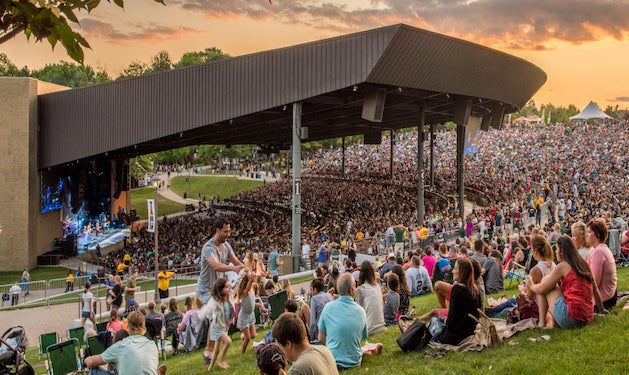Before returning to Bethel Woods, Santana discusses the hallowed location and his singular Woodstock experience.
When Carlos Santana and his band took the stage on the second day of the Woodstock festival, they were just shy of releasing their debut record, and they were little known outside of San Francisco.
By the time Santana left the stage, they had earned a spot in the rock pantheon. It was a breakout set of the festival, with their sonic blend incorporating Latin and African rhythms and percussion, blues influences, powerful Hammond organ work by Gregg Rolie, a legendary drum solo by Mike Shrieve, and an extraordinary performance from Carlos on his Gibson SG Special.
Carlos returned to Bethel Woods for the first time in 41 years in 2011 to perform at the site where it all took flight, and he returned again for Woodstock’s 50th anniversary. This summer’s Santana performance, days before Carlos’ 77th birthday, makes number six.
Carlos was focused for our quick chat and ready to get metaphysical. His speaking style tended to combine three or more words or phrases (“frequency, vibration, and energy”), like making chords with words.
As we revisited Carlos’ crucial time on the Woodstock stage, he did answer the question about performing under the influence, but he did not exactly clear up which hallucinogen it was that famously turned his guitar neck into a snake.
Carlos Santana: Hi hi!
Bethel Woods: Hello! I'm curious about the two-week period before Woodstock when you and the band lived in a rented house together. Do you remember anything about that time?
I remember very clearly, yes, there was a beautiful restaurant that we used to hang out at a lot. And I was fascinated because it seemed like there was a community with Bob Dylan, Jimi Hendrix, and Paul Butterfield. A lot of people were living around that area at that time and so me, being a fan of all of them, it was just very...with enthusiasm.
Was it located in Woodstock, the town?
We were in the town Woodstock, so we had to fly in a helicopter to the actual concert because it was a lotta traffic. Gridlock.
Right. You've said that you were under the influence during your Woodstock set. Do you know what drug it was?
It wasn't a drug; it was medicine. It was ayahuasca. It was mushrooms.
Do you know if the others were on that as well?
I don't think so, they mighta had [something] but I think I'm the only one that Jerry Garcia offered [this] like candy for me to check it out, and I did, and it was fun.
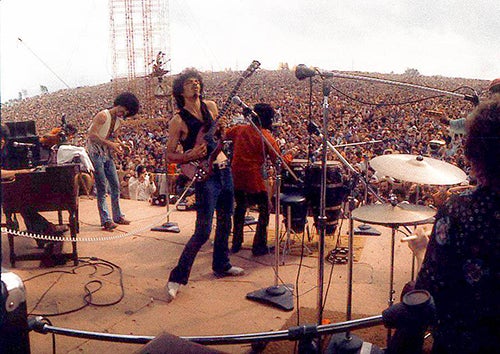
Photo by Jim Marshall
What did the crowd look like from the stage?
It looked like an ocean of flesh and eyes and arms and teeth and...you know, it looked like an ocean, a living ocean of people.
I was watching the footage of Santana at Woodstock - and have you watched it lately?
I haven't seen it in a while, no.
Some of the audience memories sound like there was a magic at play during your set. Someone standing at the front during your set commented, "...they were so good [that] the hairs on the back of my neck stood up." Another called it spiritual. And for "Soul Sacrifice", someone said, "That moment when the drum solo feeds back into the whole band. I'm sure the whole universe shivered at that moment."
Were you on a higher level? Did you and the band just happen to gel well that day, or what do you think was going on?
All of the above. It felt like we were connected with an epicenter of something that is beyond comprehesion. So it wasn't intellectual music, it wasn't mind music. It was pretty much like a...like a convention of shamans bringing medicine. At that time there was a lot of discord with [the] United States, with the Vietnam war, and the riots, and everywhere you know, between blacks and whites...And so the Woodstock festival was real medicine to bring real unity, harmony, and oneness, you know? Somehow the people who came to Woodstock, we firmly believed that there was a place to create equality, fairness, and justice.
Hippies believe in something different than the pope. Different than religion or politicians. Let's put it that way, you know? It's not that frequency of religion or politics. Is more of a frequency like being one with the universe, you know like plants and flowers and the sun and, I guess, like American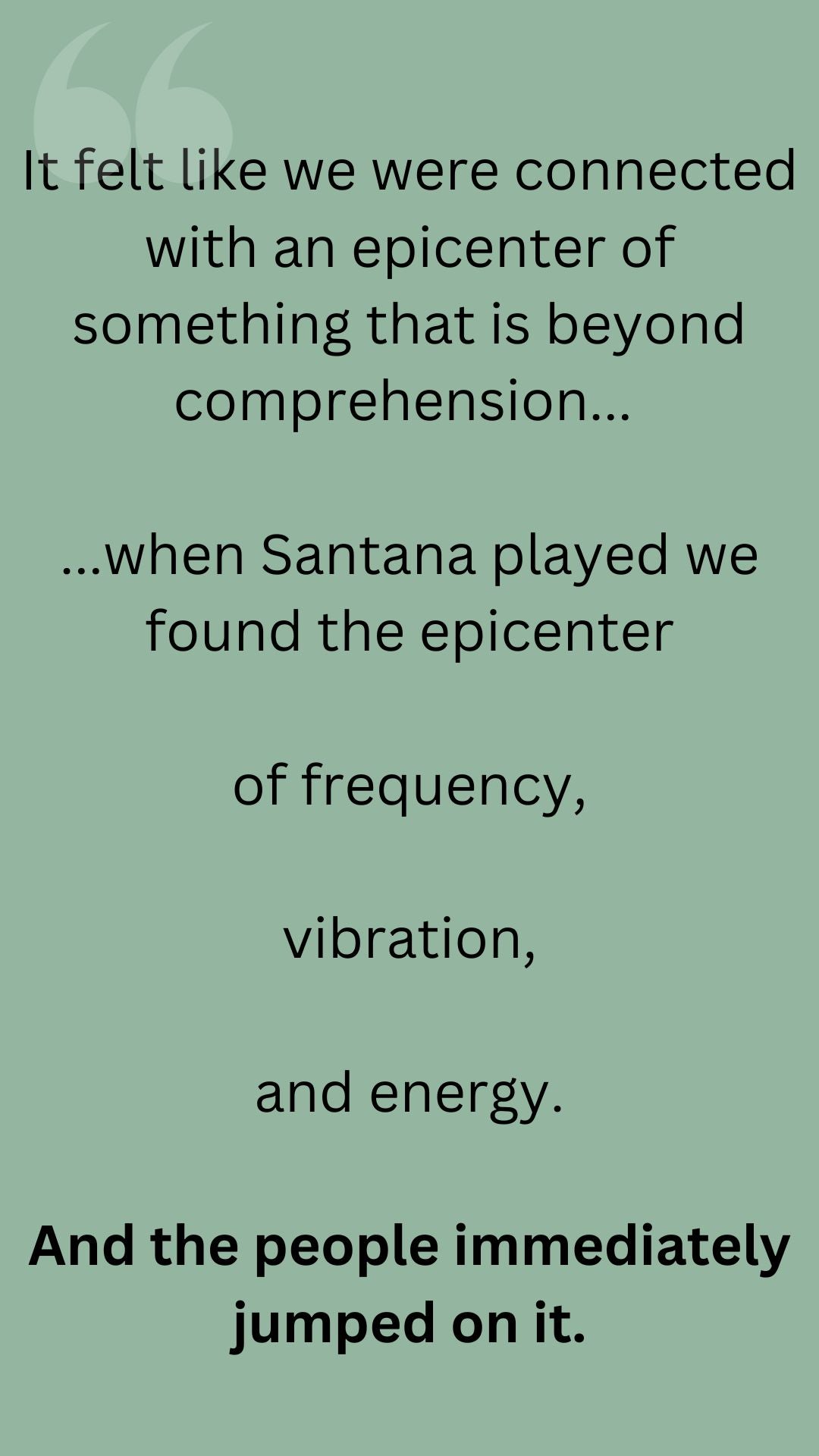 Indians. You know, American Indians have that — like, a deep awareness, that's what I call it. So when Santana played, we found the epicenter of frequency, vibration, and energy, and the people immeditately jumped on it.
Indians. You know, American Indians have that — like, a deep awareness, that's what I call it. So when Santana played, we found the epicenter of frequency, vibration, and energy, and the people immeditately jumped on it.
And when I hear other musicians talk about it, you know, I hear from people like Peter Townsened from the Who and other people who saw the concert either on the movie or however they saw it they knew this was different. For me from what I remember. Because Sly Stone went on at 2:30 in the morning almost 3:00 in the morning. To me they were the best. Energy-wise and presentation-wise. Sly Stone, Jimi Hendrix, Santana, and then everybody else. Gotta get in line. You know? For me the epicenter of number one: Sly Stone, Jimi Hendrix, Santana. The video don’t lie.
It's true. Would you ever have thought back then that you'd be coming back to play the same spot days before you turn 77?
No, I didn't think like that. I tend to live more in the moment than yesterday or tomorrow. I'm a 'now' guy. You know? Because everything is happening in the now for me.
But if you could think back, at this age, what would you like to tell yourself at 22 back then at Woodstock?
Enjoy it, you know, and have fun. You know, one of the most difficult things for humans to do lately is to be happy and have fun. So, it's no different from back then because people tend to worry too much and they stress too much, and they succumb to fear too much. You know?
I think the reason that people keep talking about Woodstock, like when Jesus was at the mountain you know passing around gluten-free bread and mercury-free fish? [laughter] People take Woodstock at that level, like when Jesus was passing around fish and bread, you know? And that's because there's something about that concert, that I mean there's other concerts who were bigger or this or that you know, but there was something about that frequency of peace, love, and good music that it was gonna be very difficult and challenging to surpass.
You've kind of touched on this already, but you've said when playing at Bethel Woods that the Woodstock site is hallowed ground, a sacred place. What did you mean by that?
It's a sacred place because it gave birth to believing that we could actually coexist in harmony. And a lot of the straight people, you know you have the squares and the straights, and you have the hippies. And the straight people and squares were very cynical and arrogant about all the freaking dirty hippies you know, who do they think they are, you know, because we believe in peace. And so how dare you believe in peace, you know, what planet are you on.
And we're like: Man, we're on the planet of Earth and this is a planet of manifesting the highest. So, you know, I don't apologize for saying I grew up in San Francisco in Haight Ashbury with Jerry Garcia and the Grateful Dad and Big Brother and the Holding Company and Quicksilver. I grew up with all of that at the same time that I grew up with Sly Stone and Jimi Hendrix and Ravi Shankar. So, San Francisco had something that even at the time the Beatles wanted to check it out. So, I remember George Harrison came to Haight Ashbury, they wanted to witness this frequency of harmony, that it was different in the rest of the world, you know?
So, do you think that the Haight and the site of Woodstock are special places that exhibit that harmony?
Yes, it's sacred because that frequency or philosophy whatever you wanna call it, if that was implemented right now in places where there was a pocket of fear and war and all that kind of stuff...This particular generation if we're allowed again to permeate the radio, the TV, the billboards, posters...all that kinda stuff; this is different than what Korea, China, and Russia, the Middle East, they're talking about nuclear war. You know? And the hippies are talking about harmony, peace, compassion, kindness, mercy, and forgiveness. Those are different kinds of elements and ingredients for humans to have a delicious existence.
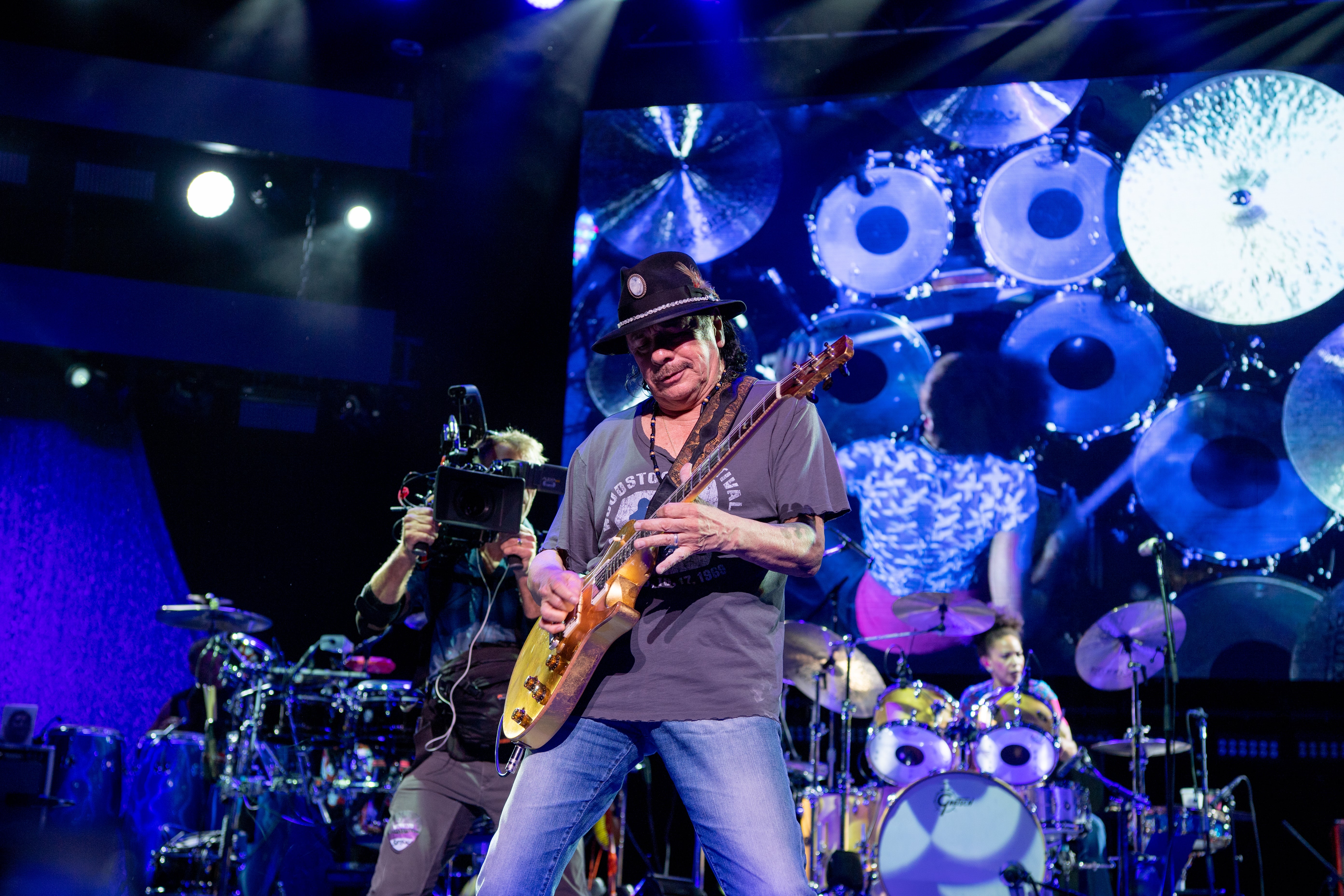
for the sixth time this summer (2024).
How do you feel about coming back to Bethel Woods for performance number six?
I feel really grateful, we have a lot of energy, a lot of clarity, and profound purpose. So, that makes us even more, uh, not dangerous because we're not competing or comparing against anybody, but that makes us very mighty and powerful because now we know more what we're doing, and why we're doing it, and how we're doing it. Which is to transform fear and ignorance by bringing light, wisdom, and [laughs] as the hippies would say: "and good vibes, man," you know? [laughter]
Positive vibrations.
Yes. Your new single with Darryl "DMC" McDaniels has a message of peace. Can you talk about that?
Yes, I feel really grateful that I'm in a position to invite people to coexist with unity, harmony, oneness, and it's a great message and it fills me with enthusiam because we want to spread hope and courage around the world. There's too much of the other stuff: fear, ignorance, and darkness. There's too much of that, you know. Everywhere.
Are there any other memories of Woodstock that you would like to add?
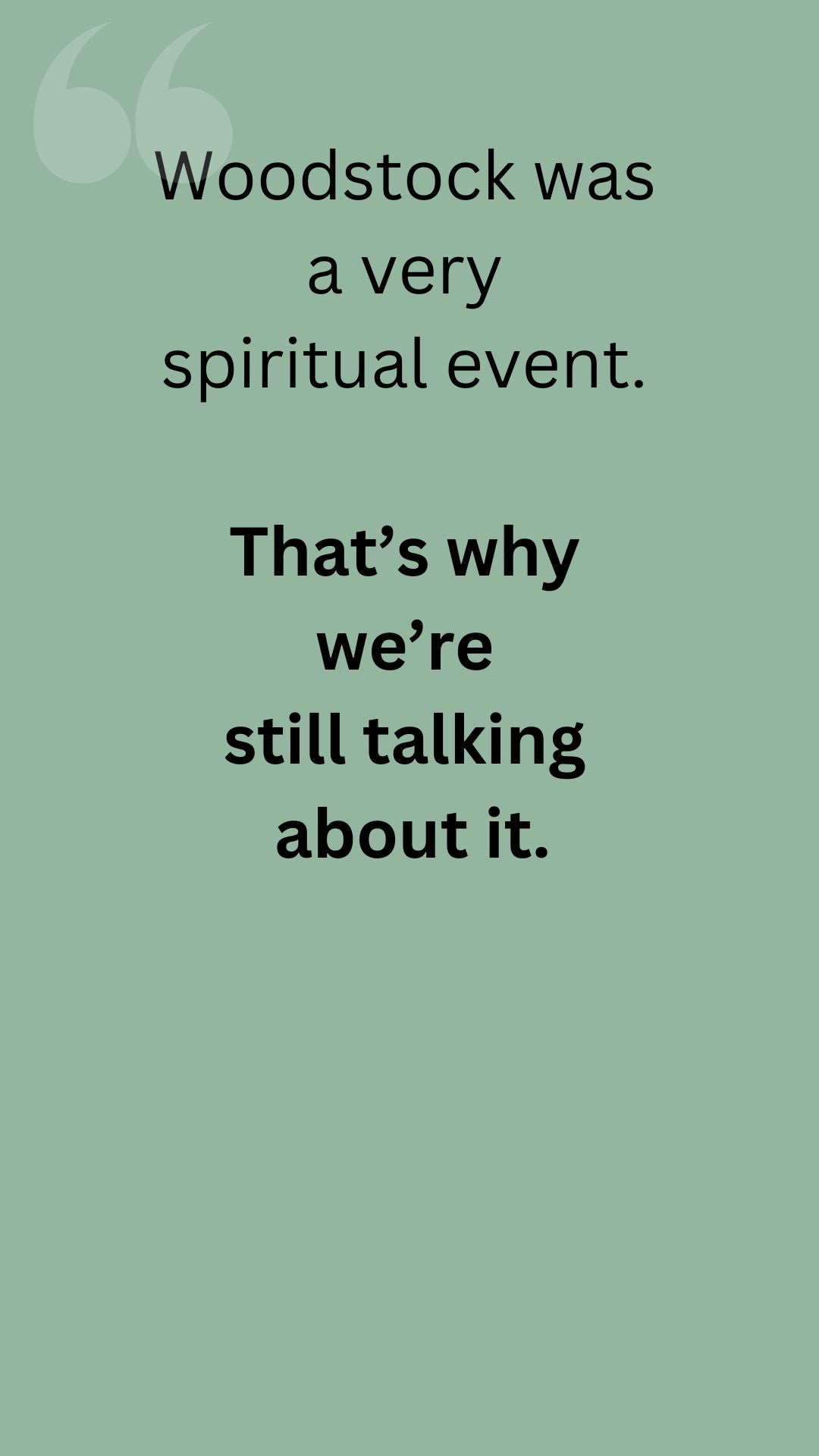 My memories of Woodstock, the main one, is how free people were from religion and politics. I mean, we were really free at that place. It was an epicenter of not yielding to corrupt corporations. Because religion and politics are still a corrupt corporation, you know? So, spirituality is like pure pristine water that comes from the sky. Religion is like Coca-Cola and Pepsi cola. So, I'd rather go for the pure water, you know? There's a difference between pure spirituality and religion. And Woodstock was a very spiritual event. That's why we're still talking about it.
My memories of Woodstock, the main one, is how free people were from religion and politics. I mean, we were really free at that place. It was an epicenter of not yielding to corrupt corporations. Because religion and politics are still a corrupt corporation, you know? So, spirituality is like pure pristine water that comes from the sky. Religion is like Coca-Cola and Pepsi cola. So, I'd rather go for the pure water, you know? There's a difference between pure spirituality and religion. And Woodstock was a very spiritual event. That's why we're still talking about it.
Thank you.
Well thank you so much for the time today.
Thank you. Have a great existence.
